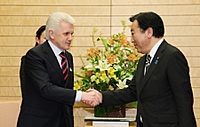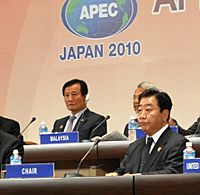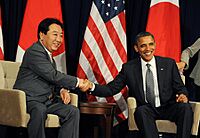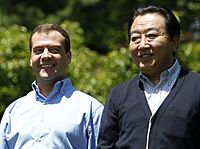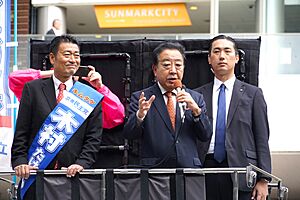Yoshihiko Noda facts for kids
Quick facts for kids
Yoshihiko Noda
|
|
|---|---|
|
野田 佳彦
|
|
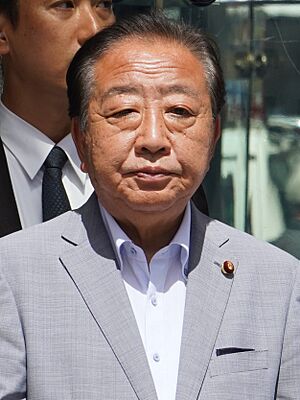
Noda in 2025
|
|
| Prime Minister of Japan | |
| In office 2 September 2011 – 26 December 2012 |
|
| Monarch | Akihito |
| Deputy | Katsuya Okada (2012) |
| Preceded by | Naoto Kan |
| Succeeded by | Shinzo Abe |
| Leader of the Constitutional Democratic Party | |
| Assumed office 23 September 2024 |
|
| Deputy | Akira Nagatsuma Kiyomi Tsujimoto Hiroshi Ogushi |
| Preceded by | Kenta Izumi |
| Secretary-General of the Democratic Party | |
| In office September 2016 – September 2017 |
|
| President | Renhō |
| Preceded by | Yukio Edano |
| Succeeded by | Atsushi Oshima |
| President of the Democratic Party of Japan | |
| In office 29 August 2011 – 25 December 2012 |
|
| Preceded by | Naoto Kan |
| Succeeded by | Banri Kaieda |
| Minister of Finance | |
| In office 8 June 2010 – 2 September 2011 |
|
| Prime Minister | Naoto Kan |
| Preceded by | Naoto Kan |
| Succeeded by | Jun Azumi |
| Senior Vice Minister of Finance | |
| In office 16 September 2009 – 8 June 2010 Serving with Naoki Minezaki
|
|
| Minister | Hirohisa Fujii Naoto Kan |
| Preceded by | Wataru Takeshita Masatoshi Ishida |
| Succeeded by | Motohisa Ikeda Naoki Minezaki |
| Member of the House of Representatives | |
| Assumed office 26 June 2000 |
|
| Preceded by | Shōichi Tanaka |
| Constituency | Chiba 4th (2000–2024) Chiba 14th (2024–present) |
| In office 19 July 1993 – 27 September 1996 |
|
| Preceded by | Multi-member district |
| Succeeded by | Constituency abolished |
| Constituency | Chiba 1st |
| Member of the Chiba Prefectural Assembly | |
| In office 23 April 1987 – 5 July 1993 |
|
| Constituency | Funabashi City |
| Personal details | |
| Born | 20 May 1957 Funabashi, Chiba, Japan |
| Political party | CDP (since 2020) |
| Other political affiliations |
JNP (1992–1994) NFP (1994–1997) DPJ (1998–2016) DP (2016–2018) Independent (2018–2020) Group of Independents (2018–2019) Social Security (2019) |
| Spouse |
Hitomi Noda
(m. 1992) |
| Children | 2 |
| Alma mater | Waseda University (BA) |
| Website | Government website |
Yoshihiko Noda (野田 佳彦, Noda Yoshihiko, born 20 May 1957) is a Japanese politician. He is the current leader of the Constitutional Democratic Party of Japan (CDP). He has been a member of the House of Representatives, which is part of Japan's national parliament, since 2000. From 2011 to 2012, he served as the Prime Minister of Japan.
Noda began his political career in 1993 with the Japan New Party. In 1996, he joined the Democratic Party of Japan (DPJ). After the DPJ won the 2009 general election, Noda became a senior vice minister of finance. In 2010, he was appointed Minister of Finance. When Prime Minister Naoto Kan resigned, Noda won the leadership election and became prime minister on September 2, 2011.
After the DPJ lost many seats in the December 2012 general election, Noda resigned as party leader. He was replaced as Prime Minister by Shinzo Abe on December 26, 2012. As the DPJ changed and merged with other parties, Noda became an independent politician. In 2021, he joined the CDP, which is a main successor to the DPJ. In 2024, Noda won the CDP's leadership election, becoming the party's president. Soon after, the 2024 Japanese general election was held, and the CDP achieved its best results ever.
Contents
Early Life and Education
Yoshihiko Noda was born in Funabashi on May 20, 1957. His father was a paratrooper in the Japan Self-Defense Forces. Unlike many famous Japanese politicians, Noda did not come from a family with strong political connections. His parents were not wealthy.
Noda finished high school in 1975. He then studied Political Science at Waseda University, graduating in 1980. Later, he was accepted into the Matsushita Institute. This institute was started by Kōnosuke Matsushita, who founded Panasonic. It aims to train future leaders for Japan. While at the Matsushita Institute, Noda worked part-time reading gas meters in his home area of Chiba Prefecture. He did this to get to know the people he hoped to represent in the future. He was first elected to the Chiba Prefectural Assembly in 1987 when he was 29 years old.
Political Career in the Diet
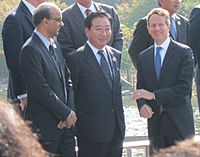
In 1993, Noda was elected to the Diet (Japan's parliament) for the first time. He represented the Chiba 1st district as a member of the Japan New Party. After changes to election districts in 1994, Noda ran in the Chiba 4th district in 1996 but lost. He then joined the Democratic Party of Japan (DPJ) and successfully won the Chiba 4th district in the 2000 election. As a DPJ member, he managed the party's Diet affairs and led its public relations.
In October 2005, Noda spoke about Japan's "class A war criminals," saying they were not legally war criminals from his point of view. However, he supported Prime Minister Jun'ichirō Koizumi's visits to Yasukuni Shrine.
Noda served as senior vice finance minister under Prime Minister Yukio Hatoyama after the DPJ won the 2009 election. In June 2010, Prime Minister Naoto Kan appointed him as Minister of Finance. Noda was known as a reformer and a fiscal conservative. He aimed to reduce Japan's government debt. In January 2011, the finance ministry bought dollars to control the yen's rising value, which was the first time this had happened in six years.
Prime Minister (2011–2012)
After Naoto Kan resigned in August 2011, Noda ran in the DPJ's leadership election to replace him. He won against Banri Kaieda in a runoff vote, making him the likely next prime minister. He faced the big challenge of rebuilding Japan after the 2011 Tōhoku earthquake and tsunami.
During his leadership speech, Noda compared himself to a "dojo loach," a type of fish that lives at the bottom of muddy waters. He said, "I'll never be a goldfish in a scarlet robe, but like a loach in muddy waters. I'll work hard for the people, to move politics forward." This "loach speech" was popular and helped his reputation.
Noda focused on foreign policy and had strong ties with the United States. He emphasized the importance of the US-Japan security alliance in an August 2011 speech. On August 15, 2011, the anniversary of Japan's surrender in World War II, he stated that Japan's class A war criminals were not legally war criminals in his view. As prime minister, he said his stance on this issue would follow past governments. He also wanted to maintain good relationships with China and South Korea.
Nuclear Energy Policy
In his first speech as Prime Minister on September 2, 2011, Noda confirmed that the Japanese government would continue to reduce its reliance on nuclear power. This meant not building new nuclear power plants and not extending the life of old ones. In May 2012, some nuclear power plants that had been shut down after the Fukushima accident were restarted to meet Japan's energy needs, despite public protests.
Trans-Pacific Partnership
One of Noda's key goals as prime minister was to have Japan join the negotiations for the Trans-Pacific Partnership. He announced this on November 11, 2011. This idea was debated a lot in Japan.
Senkaku Islands Dispute
The Tokyo Metropolitan Government wanted to buy the Senkaku Islands, which are also claimed by China and Taiwan. The Governor of Tokyo wanted to build facilities on the islands to show they were Japanese territory. However, Noda's national government thought this might make tensions with China worse. On April 27, 2012, the Tokyo government started collecting money from the public to buy the islands. By September 2012, they had raised 1.4 billion yen (about $17.8 million).
On August 24, Noda appeared on television and promised to ask the international community to support Japan's claims to these islands. On September 11, the Japanese government officially took control of Minami-kojima, Kita-kojima, and Uotsuri islands by buying them from a private family for ¥2.05 billion. China's Foreign Ministry strongly objected, saying Beijing would not "sit back and watch its territorial sovereignty violated."
Consumption Tax Increase
Another major goal for Noda was to increase Japan's consumption tax from 5% to 10%. Noda said he "staked his political life" on passing this law. The bill passed the lower house of the Diet on June 26, 2012, and the upper house on August 10, 2012. On August 10, 2012, Noda survived a vote of no-confidence after proposing the tax increase. During discussions about the tax, Noda promised to call an early election "soon." He later said he would have resigned as a lawmaker if he had not been able to pass the tax increase.
Noda was praised for passing the consumption tax hike despite strong opposition. However, he was also criticized for making the DPJ's policies too similar to its rival, the LDP, instead of keeping the promises that helped the DPJ win in 2009.
Defeat in the 2012 General Election
On September 21, 2012, Noda won the DPJ's leadership election again. He said he wanted to strengthen the party to serve Japan better. On November 14, 2012, Noda announced that the Diet would be dissolved on November 16, and a general election would be held on December 16. Many DPJ members were against this because the party was not doing well in polls.
Before the election campaign began in December, the DPJ managed to reduce the gap in polls with the LDP. This gave them hope that they could prevent the LDP from winning a clear majority. Noda also brought back the Trans-Pacific Partnership as a key campaign issue, focusing on opening up markets.
In the general election on December 16, the LDP won a big victory under Shinzo Abe. The LDP gained a clear majority, while the DPJ lost about three-fourths of its seats. Noda immediately resigned as president of the DPJ, taking responsibility for the defeat.
After Being Prime Minister
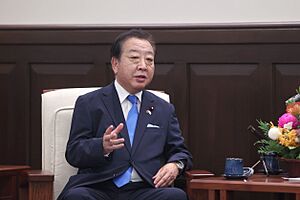
In March 2016, the DPJ merged with another party to form the new Democratic Party. In September of that year, Renhō, a politician close to Noda, was elected president of the party. Noda was then appointed secretary-general. This was controversial because many in the party still blamed Noda for the 2012 election loss. Noda and Renhō both resigned from their positions after poor results in the July 2017 Tokyo Metropolitan Assembly elections.
After the assassination of Shinzo Abe on July 8, 2022, Noda attended Abe's state funeral on September 27. Most lawmakers from the Constitutional Democratic Party of Japan, including former prime ministers Yukio Hatoyama and Naoto Kan, were not there. Noda gave a speech about Abe in the House of Representatives on October 25, 2022.
In late August 2024, Noda announced he would run in the Constitutional Democratic Party presidential election the next month, challenging the current leader Kenta Izumi. He won the election on September 23, defeating Yukio Edano in a runoff.
Leader of the Constitutional Democratic Party
After winning the election, Noda appointed Akira Nagatsuma, Kiyomi Tsujimoto, and Hiroshi Ogushi as his deputies. He also appointed Junya Ogawa as secretary general. He formed his new "Next Cabinet" on September 30, 2024.
Under Noda's leadership, the CDP made significant gains in the 2024 Japanese general election on October 27. The ruling LDP-Komeito coalition lost its majority. On November 11, Noda tried to become prime minister but lost to the LDP's Shigeru Ishiba during a special session of the Diet.
In February 2025, after a strong disagreement between US President Trump and Ukrainian President Volodymyr Zelensky, Noda said Prime Minister Ishiba's response was "not enough." He added that "Japan's stance is unclear. I'm dissatisfied."
In the 2025 Japanese House of Councillors election, the CDP gained 4 seats compared to the previous election in 2019.
Personal Life and Hobbies
Noda has been married to Hitomi since 1992, and they have two sons. He holds a black belt in judo. His favorite food is ramen, and his favorite drink is sake. He wrote a book called Enemy of the DPJ: Government Change Has a Good Cause.
In an interview, Noda mentioned he enjoys watching movies. He is a fan of Meryl Streep, who won an Academy Award for playing former British prime minister Margaret Thatcher in The Iron Lady. This movie shows Thatcher's life and career as she made big changes despite opposition. Noda also said one of his favorite movies is the 1939 film Mr. Smith Goes to Washington. This movie is about a U.S. senator who fights against political corruption.
Noda is also a fan of professional wrestling. He has said that Kenta Kobashi is his favorite wrestler. On May 11, 2013, Noda attended Kobashi's retirement event in Tokyo.
See also
 In Spanish: Yoshihiko Noda para niños
In Spanish: Yoshihiko Noda para niños
- Noda Cabinet
 | Valerie Thomas |
 | Frederick McKinley Jones |
 | George Edward Alcorn Jr. |
 | Thomas Mensah |


